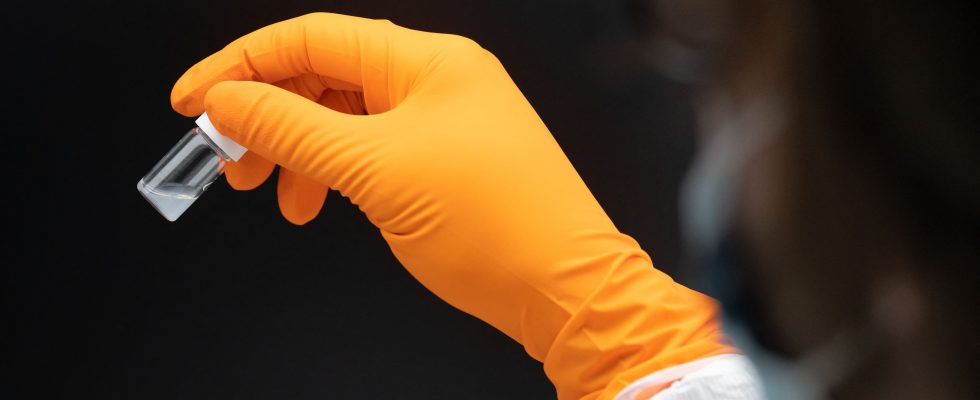It’s always the “why” that comes first. “Why me”. “Why him”. “Don’t they say that cancer and its vile swellings are diseases of the age?” “Why then does my child have these nasty bumps inside him?” Faced with these questions, the first to arise from the mouths of patients and their parents, once the shock of the diagnosis has passed, Véronique Minard-Coli, oncologist at Gustave Roussy, often remains speechless.
Because, in most cases, doctors do not know where the malignant tumors which affect 2,000 children and adolescents in France come from each year. Nothing, not a shadow of an idea. A burden for the sick. This is due to the rarity of these cancers, which are much less numerous in children. The disease, which is discovered in more than 400,000 adults per year, takes time to become severe, which reduces the risk of starting it at a young age.
A Franco-American partnership
Difficult to conclude, when we sometimes only identify around thirty cases. With numbers this small, scientists’ calculations are flawed. Impossible to verify his hypotheses. A trap, into which certain media regularly fall, which see epidemics where there are none. When we go from 8 to 16 occurrences, for example, we double, it is true, without being able to say that the cases are numerous.
To resolve these unknowns, while most adult cancers are much better studied, the INCa (National Cancer Institute) has been trying for several months to set up a coalition. The idea: to pool national data and thus improve surveillance and treatment. An emergency, because although these pathologies are rare, they represent the leading cause of disease-related mortality at this age.
A sign that these efforts are starting to pay off, this Thursday, the French institution formalized a partnership with its American counterpart, the National Cancer Institute. The culmination of tough negotiations, a good part of which were carried out during the “Paris conference”. It took place last November, in the presence of leading international oncologists.
The other Paris conference
Like the Paris climate conference, this event was an opportunity to agree on a scientific roadmap and take stock of needs. This Thursday’s announcement thus serves as a launch. This unprecedented work of international cooperation is currently focused on the most advanced countries, the “G7 Cancer” – France, Australia, Canada, United Kingdom, Germany, Japan, United States.
A victory for sick children, the American government welcomed, on the sidelines of the agreement. “I am convinced that this partnership will bring major advances,” Health Secretary Xavier Becerra said in a statement. “It is finally the opportunity to set up a systematic sharing of knowledge, and to go much further than the local initiatives already at work”, adds for The Express Thierry Breton, general director of INCa.
In the coming months, tests focused on particular cases should be launched to identify what works and what blocks. Nomenclature, sharing of tools and methodologies, the difficulties are still numerous. “We have spent the last two years synchronizing our scientific languages with the Americans,” explains Véronique Minard-Coli, also scientific advisor on the project.
Speak the same language
Depending on the vocabulary used, it is sometimes difficult to converge the data. “If we talk for example about sarcoma of the cheek, instead of the hemiface, we may think that they are two different tumors, when in reality, they are the same thing,” illustrates the researcher , also president and vice-president of the French Society for Childhood Cancers (SFCE). It will also be necessary to agree on the interpretations of the results: not everyone has the same thresholds.
A much more political initiative than it seems, while scientific cooperation is increasingly threatened, due to renewed geopolitical tension: “We must ensure mutual trust, transparency and the reciprocity of each participant”, explains Véronique Minard-Coli. Do not encroach on the areas of expertise, the scientific areas of each country, of each team. Do not offend those who are not currently participating.
Keeping the vultures at bay, too: “For around five years, we have been regularly approached by China, which would like us to provide them with our expertise, but which has never shared its elements,” notes the specialist. Avoid regulatory pitfalls, above all: “For more than three years, for example, it was impossible for us to share with the United States, due to differences on the GDPR,” explains Thierry Breton.
After the data, the wallet
Scientists hope to advance research, while still 20% of pediatric cancers have no treatment. “The objective is to heal more, and heal better,” adds Véronique Minard-Coli. “Children often have lifelong after-effects, because of the disease, and also from the treatments, which are very toxic for some.” Ultimately, the G7 cancer institutions also want international cooperation to open up to other issues in the sector.
Because if more and more cancers are cured, around 70% now, the most difficult ones still need to be tackled. Oncological medicine is becoming more complex and personalized, which requires investments that often go beyond national portfolios. “We are talking about research programs costing several tens of millions of euros, compared to a few hundred thousand previously,” explains Thierry Breton. After the data, the wallet.
.
